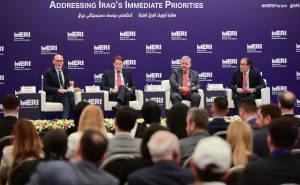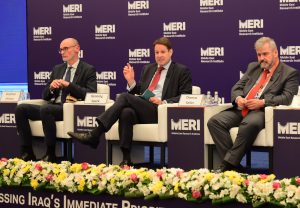Iraq and International Partners: Engagement, Mutual Perceptions & Shared Visions
- Stephen Hichen, The UK Ambassador to Iraq
- Thomas Seiler, Head of European Union Delegation in Iraq
- Henning Speck, National Security Advisor, CDU/CSU Coalition, German Bundestag
- Farhad Alaaldin, Advisor to the Prime Minister of Iraq on Foreign Affairs
In this session, Iraq’s foreign relations with international partners were discussed. Farhad Alaaldin, a speaker and moderator of the session, outlined the Government of Iraq (GoI)’s vision for foreign relations, under the administration of Prime Minister Mohammed Shia Al-Sudani. According to Alaaldin, the GoI’s new approach is to build relations with international partners on common interests, advocating productive diplomacy, mutual respect and engaging in international agreements for economic developments, as well as rebuilding Iraq after decades of war.
The UK-Iraq Relationship
The UK Ambassador, Stephen Hichen, addressed the audience by outlining the main aim of the UK in Iraq, which is to“advance the true stability and prosperity in Iraq.” He explained the changes in his country’s assistance programmes in Iraq, stating as an example: “we gave large amount of money during 2016/2017, four million after the liberation of Mosul, for destroyed areas. Now we don’t need to do that but rather to give expertise for the recovery of Iraq.” Amb. Hichen described the signs of recovery in Iraq as the right path of the trajectory that UK government is following after the terrible trauma that communities had suffered in the affected areas.

On the economic cooperation, Amb. Hichen believed the change of perception, especially in the security and environment, has made Iraq home for the UK business owners, who “are starting to look at Iraq as a place of opportunity, and not a place of threat.” He underlined trade at the top of the list of bilateral economic relations, stating: “in the last two years, our trade with Iraq has gone up by 85%.”
On Iraq’s economic reforms, Amb. Hichen said, “we have a team here who are experts in changing the tax system from paper-based system to digital systems”. He went on to emphasize the importance of addressing the political and governmental challenges, an area that the UK can provide much needed expertise. He reminded the audience that “the economic and demographic problem that you [Iraq] have, you are currently 40 million people, by 2040 you will be 70 million people, and as the oil price will be lower in the future, the amount of money that will be available per person will be a lot lower.”
Iraq and Germany
Mr Henning Speck of the German Bundestag emphasized that assisting the Iraqi stabilization and new vision of governance is in the interest of the German government. “It is of utmost importance for us in Germany, and Europe as whole, to continue closely with the events happening in Iraq to establish a joint plan of action and corporation”. He recalled that, “it was a turning point in Germany back then between the parties not to send the weapons to a country in crisis, and we’ve changed that policy for Iraq, and for the first-time sending Milan rockets to Iraq for a good cause, and now it pays off in the war against Ukraine”.
Mr Speck reassured the audience about Germany’s commitment to continue to support Iraq’s security institutions, such as providing advice and trainings for security sector reform and long-term stability “under the umbrella of the NATO training missions”.
Responding to a question, whether it is possible to see a unified non-partisan Peshmarga Force soon in Kurdistan region and Iraq, Mr. Speck said, “demilitarizing the society is vital and I think this is a big challenge for the years to come, and maybe decades, to draw down the weapons that are free floating within the society.” He stressed that this can be tackled throw security sector reforms.
On the economy, Mr Speck added that in the medium and longer term, Baghdad and Erbil should work on stabilizing the oil exports and diversifying the economy:“Having fast growing population and young population, how is it possible to look at diversifying the economy and create highly value-added jobs here.”

The EU in Iraq
The EU foreign policies have dramatically changed since the Brexit and Ukraine- Russia war. However, these in
some ways have positively impacted the EU policy towards Iraq. Ambassador Thomas Seiler, Head of European Union Delegation in Iraq, emphasized that the EU’s “bilateral relations with Iraq have thee objectives: stability, stability, and stability; [and for] Iraq to have a democratic role to play in this region.” A stabilized Iraq means a stabilized economic interest. He stressed: “we are very happy to be here, Iraq is a country of growing the importance.”
According to Farhad Alaaldin, the EU funding for stabilization programmes in Iraq reached €420 million but asked if there are other funding programs by the EU for the region. Amb. Seiler said “there is nothing more [funds] at the moment in the pipeline as we are entering the so-called multi-annual inductive framework.” However, for the next three-year planning for EU funds, there are good programs and funding elements for the region. At the same time, the EU has other expectation from Iraq and the region. Amb. Seiler emphasized, “now, when it comes to partnership with Iraq, in that sense we also have expectation. We want you work with us, working with our objectives.” He stated that the funds will be coming if both EU and Iraq work together on the productive diplomacy through good tools, technical and financial support, and expertise from the EU institutions for better governance in the region.
Amb. Seiler reminded the audience that the EU has assisted Iraq in state-building and security reforms through the 80 European security advisors who are based in the region. However, he characterized Iraq as one of the highest risk countries, in terms of security, saying: “there is still lack of a clear structure of security sector. Who does what, and who has which competence and how the whole sector is organized, especially in the military sector.” He pointed out this can be applied to other sectors, including civilian sectors.

The Plight of Yezidi
In response to a question about stabilization of Sinjar and return of the displaced Yezidis, Amb. Hichen stated that Sinjar is a very complicated area and added,:“in Sinjar, you have a strategic location, divisions, you have regional competition, and you have international dimensions, all playing out in Sinjar.” He believed the Sinjar conflict can be resolved if the Yezidis are assisted to return to their district and homes after good reparation and implementation of the Yazidi Survivors’ law, and returning mechanisms.
On the question of the atrocities committed by ISIS against the Yezidi communities in Iraq, Amb. Hichen spoke to the UK’s recognition of this act of genocide and said: “we recognized it when a legal court has decided a genocide has taken place. This is the British approach to this, that was when the German Court found ISIS fighters who are guilty of genocidal crime,”.
Mr. Speck also underlined the importance of keeping the rights of the minorities and added: “this is very closely linked to our history in Germany where we did crimes against the specific minority groups, and we’ve learnt from that how important respecting the minorities is for the medium- and long-term stability in any country.”
MERI Forum 2023
Addressing Iraq’s Immediate Priorities
10 & 11 October, 2023
Session 4: Iraq and International Partners: Engagement, Mutual Perceptions & Shared Visions (A)
Session Video

